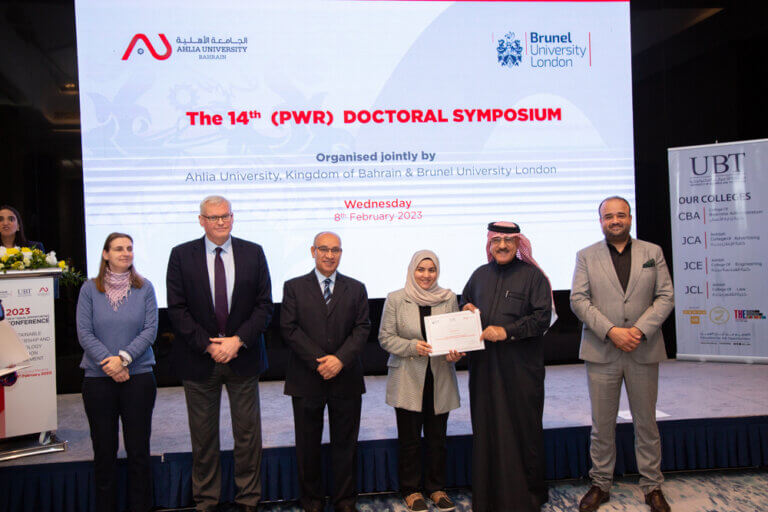The Founding President and Chairman of the Board of Trustees of Ahlia University Prof. Abdullah Al Hawaj and the President of Ahlia University Prof. Mansoor Alaali confirmed that the Ph.D. symposium, organized annually by Ahlia University in collaboration with Brunel University, London, demonstrated distinguished and competitive researchers, noting that Bahraini women showed an excellent participation in presenting and discussing their scientific papers and studies that tackled the recent issues in order to find effective solutions and provide recommendations for future studies.
In her keynote, Dr. Zakeya Sanad shared her experience in the Ph.D. program. She is an active reviewer and won the “Young Woman Researcher in Corporate Governance Award” on 23rd January 2023. Dr. Zakeya provided tips to ease the phase of obtaining a Ph.D. degree. These tips illustrated the importance of listening to the supervisor’s advice, do not compare yourself to others, learning to rest not to quit if you get tired, and establishing a routine. Further pieces of advice confirmed the importance of submitting the research studies to at least 3 – 4 journals, participating in workshops and presenting the papers in conferences to receive comments and take advantage of the recommendations from the scientists and other researchers, joining different associations and bodies to be updated of the recent developments.
Ms. Aysha Aljawder discussed part of her research paper titled “Assessing the adoption of Key Principles for a Sustainable Lean Interior Design in the Construction Industry: The Case of Bahrain”. She illustrated that the annual construction waste is expected to reach 2.2 billion tons globally by 2025, and 30% of building materials delivered to a construction site can end up as waste. Therefore, the study aimed to critically investigate potential factors influencing the effect of lean management for sustainable interior design in the public construction sector.
While Ms. Zainab Majed’s study focused on the effects of flipped classroom practice on improving students’ engagement when interpreting relations between geometrical shapes. The research had highlighted the benefits of collaborative learning practice and technology in the flipped classroom environment. In addition, the findings provided evidence of the positive effect of in-class collaborative working on students’ involvement, cohesiveness, and satisfaction. It also highly supported previous research, acknowledging that flipped classroom promote student motivation as a result of the active learning environment.
The study of Ms. Reem Syed Mansoor concluded that there is a relationship between technology, market accessibility, and market classifications. Hence, the financial markets with advanced technology and better market accessibility conditions are promoted to higher market classifications considering the better environment the provide to investors. This is measured through three factors such as market infrastructure, regulations, and openness to foreign ownership.
Ms. Maryam AlDhaen’s paper titled “Artificial Intelligence enabled sustainable Banking Sector Ecosystem in Kingdom of Bahrain”, explained the relationship between AI and sustainable decision-making plan, as well as studied how the banking sector faced the challenges of AI. The study concluded that the adoption of AI in the system will lead to effective multiple managed decisions, better than the classical and traditional way.
Ms. Hanin AlDoy presented a literature review of her research which aimed at the emerging employee engagement concepts, the anchoring theories of the development of employee engagement, and the strategies and constructs of employee engagement in the workplace.
For her part, Ms. Maha AlSadoon discussed the benefits of using edge computing, which is represented in reduction of latency by processing the data closer to the costumer, providing more security than computing at the cloud because it is less vulnerable to numerous varieties of threats to its scope, sending data from edge to the cloud takes up spectral resources, there’s just not enough bandwidth for data transportation. Lastly, by processing data at the edge, you eliminate network reliability problems. The study concluded that cloud computing and edge computing are complementary and mutually reinforcing. Despite edge computing’s promise, vital issues still hinder its rapid implementation and development.
Female Researchers won the research awards, where Ms. Zainab Jaber won the best research paper and the second-best presentation, Ms. Reem Sayed Mansoor won the second-best scientific paper and Ms. Maha Al Sadoun won the first-best presentation.




